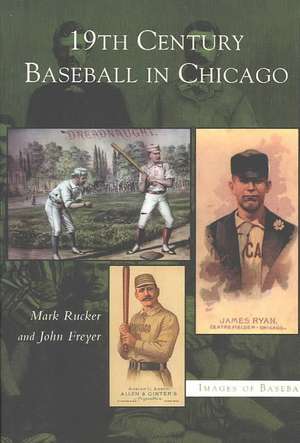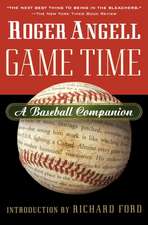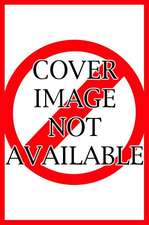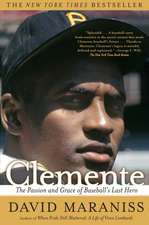19th Century Baseball in Chicago: Images of Baseball
Autor Mark Rucker, JOHN FREYERen Limba Engleză Paperback – 31 oct 2003
But The National Pastime arrived in Chicago well before the 1876 season, as is proven in this fascinating new book, 19th Century Baseball in Chicago, illustrated with over 150 vintage images.Any local fan of the modern game-whether the action takes place at the "Friendly Confines," 35th & Shields, or the cozy setting of a minor league ballpark out in Kane or suburban Cook County-will enjoy the wealth of information offered in 19th Century Baseball in Chicago.
Din seria Images of Baseball
-
 Preț: 118.77 lei
Preț: 118.77 lei -
 Preț: 133.17 lei
Preț: 133.17 lei -
 Preț: 132.13 lei
Preț: 132.13 lei -
 Preț: 133.41 lei
Preț: 133.41 lei -
 Preț: 117.72 lei
Preț: 117.72 lei -
 Preț: 133.00 lei
Preț: 133.00 lei -
 Preț: 117.31 lei
Preț: 117.31 lei -
 Preț: 132.76 lei
Preț: 132.76 lei -
 Preț: 133.17 lei
Preț: 133.17 lei -
 Preț: 133.17 lei
Preț: 133.17 lei -
 Preț: 133.00 lei
Preț: 133.00 lei -
 Preț: 133.00 lei
Preț: 133.00 lei -
 Preț: 132.54 lei
Preț: 132.54 lei -
 Preț: 133.17 lei
Preț: 133.17 lei -
 Preț: 133.00 lei
Preț: 133.00 lei -
 Preț: 132.13 lei
Preț: 132.13 lei -
 Preț: 118.94 lei
Preț: 118.94 lei -
 Preț: 132.13 lei
Preț: 132.13 lei -
 Preț: 132.13 lei
Preț: 132.13 lei -
 Preț: 131.72 lei
Preț: 131.72 lei -
 Preț: 131.94 lei
Preț: 131.94 lei -
 Preț: 133.00 lei
Preț: 133.00 lei -
 Preț: 132.35 lei
Preț: 132.35 lei -
 Preț: 128.43 lei
Preț: 128.43 lei -
 Preț: 130.90 lei
Preț: 130.90 lei -
 Preț: 118.77 lei
Preț: 118.77 lei -
 Preț: 133.00 lei
Preț: 133.00 lei -
 Preț: 132.13 lei
Preț: 132.13 lei -
 Preț: 133.00 lei
Preț: 133.00 lei -
 Preț: 131.94 lei
Preț: 131.94 lei -
 Preț: 131.94 lei
Preț: 131.94 lei -
 Preț: 131.72 lei
Preț: 131.72 lei -
 Preț: 131.94 lei
Preț: 131.94 lei -
 Preț: 127.39 lei
Preț: 127.39 lei -
 Preț: 132.13 lei
Preț: 132.13 lei -
 Preț: 132.13 lei
Preț: 132.13 lei -
 Preț: 134.40 lei
Preț: 134.40 lei -
 Preț: 117.90 lei
Preț: 117.90 lei -
 Preț: 133.17 lei
Preț: 133.17 lei -
 Preț: 133.17 lei
Preț: 133.17 lei -
 Preț: 131.72 lei
Preț: 131.72 lei -
 Preț: 130.49 lei
Preț: 130.49 lei -
 Preț: 131.94 lei
Preț: 131.94 lei -
 Preț: 133.17 lei
Preț: 133.17 lei -
 Preț: 131.94 lei
Preț: 131.94 lei -
 Preț: 131.94 lei
Preț: 131.94 lei -
 Preț: 128.86 lei
Preț: 128.86 lei -
 Preț: 117.90 lei
Preț: 117.90 lei -
 Preț: 133.17 lei
Preț: 133.17 lei -
 Preț: 131.31 lei
Preț: 131.31 lei
Preț: 131.72 lei
Nou
Puncte Express: 198
Preț estimativ în valută:
25.20€ • 26.25$ • 21.01£
25.20€ • 26.25$ • 21.01£
Carte indisponibilă temporar
Doresc să fiu notificat când acest titlu va fi disponibil:
Se trimite...
Preluare comenzi: 021 569.72.76
Specificații
ISBN-13: 9780738531816
ISBN-10: 0738531812
Pagini: 128
Dimensiuni: 162 x 236 x 8 mm
Greutate: 0.29 kg
Editura: Arcadia Publishing (SC)
Seria Images of Baseball
ISBN-10: 0738531812
Pagini: 128
Dimensiuni: 162 x 236 x 8 mm
Greutate: 0.29 kg
Editura: Arcadia Publishing (SC)
Seria Images of Baseball
Notă biografică
By virtue of exhaustive research into ancient box scores and newspaper accounts dating to the early 1850s, authors Mark Rucker and John Freyer tell the story of baseball's 19th-century migration to the Midwest, its development in Chicago as an amateur sport and the city's central role in the dawn of professionalism. Both Mark and John are longstanding members of the Society for American Baseball Research (SABR).







